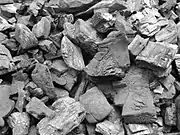ogle
English
Etymology
From Middle Dutch *ooghelen, oeghelen (“to ogle”), frequentative form of oogen (“to eye”); or from Middle Low German ogelen (“to look at, ogle”), frequentative of ogen, ougen (“to eye, see”), equivalent to og- + -le. Compare German äugeln (“to ogle”). More at eye, -le.
Pronunciation
Verb
ogle (third-person singular simple present ogles, present participle ogling, simple past and past participle ogled)
- (transitive, intransitive) To stare at (someone or something), especially impertinently, amorously, or covetously.
- Dryden
- And ogling all their audience, ere they speak.
- Dryden
Translations
to stare flirtatiously
Noun
ogle (plural ogles)
- An impertinent, flirtatious, amorous or covetous stare.
- (Polari, usually in the plural) An eye.
- 1997, Gardiner, James, Who's a Pretty Boy Then?, page 137:
- Will you take a varder at the cartz on the feely-omi in the naf strides: the one with the bona blue ogles polarying the omi-palone with a vogue on and a cod sheitel.
-
Translations
Latvian

Ogle (1)

Akmeņogle (2)
Alternative forms
- (dialectal forms) oglis
Etymology
From Proto-Balto-Slavic *anˀglis, from Proto-Indo-European *h₁óngʷl̥ (“coal”).[1]
Pronunciation
- IPA(key): [ùoɡlɛ]
Noun
ogle f (5th declension)
- charcoal (partially burnt organic materials, usually wood)
- aktīvā ogle, aktivētā ogle ― activated carbon
- melns kā ogle ― black as charcoal
- ogles zīmējumi ― charcoal drawings
- kvēlojošas ogles ― burning coals
- (syn. akmeņogle) coal (mineral deposits, used as industrial fuel)
- ogļu atradnes ― coal deposits
- ogļu ieguve ― coal mining
- ogļu rūpniecība ― coal industry
Declension
Declension of ogle (5th declension)
References
- Karulis, Konstantīns (1992), “ogle”, in Latviešu Etimoloģijas Vārdnīca (in Latvian), Rīga: AVOTS, →ISBN
This article is issued from Wiktionary. The text is licensed under Creative Commons - Attribution - Sharealike. Additional terms may apply for the media files.